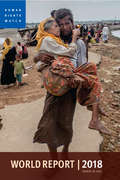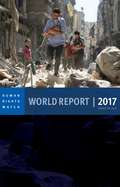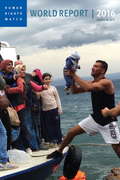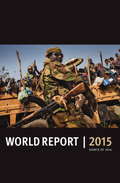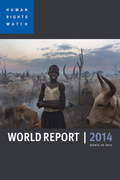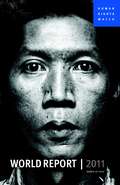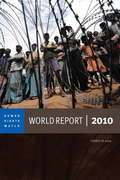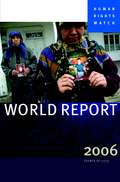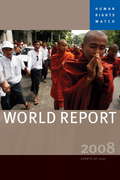Special Collections
Human Rights Collection
- Table View
- List View
World Report 2018
by Human Rights Watch and Kenneth RothThe human rights records of more than ninety countries and territories are put into perspective in Human Rights Watch's signature yearly report. Reflecting extensive investigative work undertaken in 2016 by Human Rights Watch staff, in close partnership with domestic human rights activists, the annual World Report is an invaluable resource for journalists, diplomats, and citizens, and is a must-read for anyone interested in the fight to protect human rights in every corner of the globe.
World Report 2017
by Human Rights Watch and Kenneth RothThe human rights records of more than ninety countries and territories are put into perspective in Human Rights Watch's signature yearly report. Reflecting extensive investigative work undertaken in 2016 by Human Rights Watch staff, in close partnership with domestic human rights activists, the annual World Report is an invaluable resource for journalists, diplomats, and citizens, and is a must-read for anyone interested in the fight to protect human rights in every corner of the globe.From the Trade Paperback edition.
World Report 2016
by Human Rights Watch and Kenneth RothThe human rights records of more than ninety countries and territories is put into perspective in Human Rights Watch's signature yearly report. Reflecting extensive investigative work undertaken in 2015 by Human RightsWatch staff, in close partnership with domestic human rights activists, the annual World Report is an invaluable resource for journalists, diplomats, and citizens, and is a must-read for anyone interested in the fight to protect human rights in every corner of the globe.From the Trade Paperback edition.
World Report 2015
by Human Rights WatchThe human rights records of more than ninety countries and territories is put into perspective in Human Rights Watch's signature yearly report, which, in the 2014 volume, highlighted the armed conflict in Syria, international drug reform, drones and electronic mass surveillance, and more, and also featured photo essays of child marriage in South Sudan, the cost of the Sochi Winter Olympics in Russia, and religious fighting in Central African Republic. Reflecting extensive investigative work undertaken in 2014 by Human Rights Watch staff, in close partnership with domestic human rights activists, the annual World Report 2015 is an invaluable resource for journalists, diplomats, and citizens, and is a must-read for anyone interested in the fight to protect human rights in every corner of the globe.From the Trade Paperback edition.
World Report 2013
by Human Rights Watch and Kenneth Roth"The reports of the New York-based Human Rights Watch have become extremely important. . . . Cogent and eminently practical, these reports have gone far beyond an account of human rights abuses. . . ."--Ahmed Rashid in The New York Review of Books"An attempt to bring rationality where emotion tends to dominate."--Simon Jenkins, former editor of The Times (London) In the aftermath of 2011's Arab Spring uprisings, unexpected new challenges and imperatives of building rights-respecting democracies appeared in their wake. Human Rights Watch's 23rd annual World Report explores these new challenges and summarizes human rights conditions and practices in more than 90 countries and territories worldwide, reflecting extensive investigative work by Human Rights Watch staff. Human Rights Watch's World Report 2013 is the global rights watchdog's flagship annual review of global trends and news in human rights. An invaluable resource for journalists, diplomats, and citizens, it features not only incisive country surveys but also several hard-hitting essays highlighting key human rights issues, including:*An introduction by Human Rights Watch Executive Director Ken Roth on how the Arab Spring shows us that toppling dictators may yet prove to be easier than the tough, complicated process of building a rights-respecting democracy;*An essay on a Human Rights Council resolution on "traditional values" sponsored by Russia, and the implicit dangers this could mean for LGBT rights; *An essay on the failure of many global businesses to operate with sufficient regard to human rights, and of governments to oversee them--leading to abuses such as the use of forced labor on a Canadian construction site in Eritrea, or the gang rapes of women by security guards employed by an international mining giant in Papua New Guinea.World Report 2013 also features striking photo essays by award winning photographers.
World Report 2011
by Human Rights WatchHuman Rights Watch is increasingly recognized as the world's leader in building a stronger awareness for human rights. Their annual World Report is the most probing review of human rights developments available anywhere. Written in straightforward, non-technical language, Human Rights Watch World Report prioritizes events in the most affected countries during the previous year. The backbone of the report consists of a series of concise overviews of the most pressing human rights issues in countries from Afghanistan to Zimbabwe, with particular focus on the role--positive or negative--played in each country by key domestic and international figures. Highly anticipated and widely publicized by the U.S. and international press every year, the World Report is an invaluable resource for journalists, diplomats, and all citizens of the world.
World Report 2009
by Human Rights WatchHuman Rights Watch is increasingly recognized as the world's leader in building a stronger awareness for human rights. Their annual World Report is the most probing review of human rights developments available anywhere. Written in straightforward, non-technical language, Human Rights Watch World Report prioritizes events in the most affected countries during the previous year. The backbone of the report consists of a series of concise overviews of the most pressing human rights issues in countries from Afghanistan to Zimbabwe, with particular focus on the role--positive or negative--played in each country by key domestic and international figures. Highly anticipated and widely publicized by the U.S. and international press every year, the World Report is an invaluable resource for journalists, diplomats, and all citizens of the world.
World Report 2007
by Human Rights WatchHuman Rights Watch is increasingly recognized as the world's leader in building a stronger awareness for human rights. Their annual World Report is the most probing review of human rights developments available anywhere. Written in straightforward, non-technical language, Human Rights Watch World Report prioritizes events in the most affected countries during the previous year. The backbone of the report consists of a series of concise overviews of the most pressing human rights issues in countries from Afghanistan to Zimbabwe, with particular focus on the role--positive or negative--played in each country by key domestic and international figures. Highly anticipated and widely publicized by the U.S. and international press every year, the World Report is an invaluable resource for journalists, diplomats, and all citizens of the world.
World Report 2006
by Human Rights WatchHuman Rights Watch is increasingly recognized as the world's leader in building a stronger awareness for human rights. Their annual World Report is the most probing review of human rights developments available anywhere. Written in straightforward, non-technical language, Human Rights Watch World Report prioritizes events in the most affected countries during the previous year. The backbone of the report consists of a series of concise overviews of the most pressing human rights issues in countries from Afghanistan to Zimbabwe, with particular focus on the role--positive or negative--played in each country by key domestic and international figures. Highly anticipated and widely publicized by the U.S. and international press every year, the World Report is an invaluable resource for journalists, diplomats, and all citizens of the world.
Witness to Abuse
by Human Rights WatchThe 101-page report, documents how the Justice Department denied the witnesses fundamental due process safeguards. Many were not informed of the reason for their arrest, allowed immediate access to a lawyer, nor permitted to see the evidence used against them. The Justice Department evaded fundamental protections for the suspects and the legal requirements for arrested witnesses. Their court proceedings were conducted behind closed doors, and all the court documents were sealed.
Without Remedy
by Human Rights WatchThe massive pulp and paper industry located in Riau province on the island of Sumatra, Indonesia has received increasing international attention. The industry is economically imperiled - with debts of more than U.S.$20 billion - and is decimating wide swathes of Sumatra's lowland tropical forests, some of the most biologically diverse and formerly among the most extensive in the world. Yet even in the current climate of increasing international attention to corporate responsibility, relatively little attention has been paid to persistent violations of the rights of local communities who live within Riau's forest concessions, peoples whose livelihood has depended on the forests for generations.
“We are Not the Enemy”
by Human Rights WatchPublic officials tried vigorously to contain a wave of hate crimes in the United States after September 11, Human Rights Watch said in a report released today. Nevertheless, anti-Muslim hate crimes in the United States rose 1700 percent during 2001. The report documents anti-Arab and anti-Muslim violence and the local, state and federal response to it. The forty-one page report, “We Are Not the Enemy,” draws on research with police, prosecutors, community activists, and victims of hate crimes in six cities (Seattle, Washington; Dearborn, Michigan; Chicago, Illinois; Los Angeles, California; Phoenix, Arizona; and New York, New York) to review steps taken by government officials to prevent and prosecute hate crimes after the September 11 attacks in New York and Washington, D.C. The report also examines the scope and extent of these hate crimes, which included murder, assault, arson, and vandalism. “Government officials didn’t sit on their hands while Muslims and Arabs were attacked after September 11,” said Amardeep Singh, author of the report and U.S. Program researcher at Human Rights Watch. “But law enforcement and other government agencies should have been better prepared for this kind of onslaught.”
The Warri Crisis
by Human Rights WatchConflict in Nigeria's Delta State during 2003 has led to the killing of hundreds of people, the displacement of thousands, and the destruction of hundreds of properties. Among the dead are probably dozens killed by the security forces. Although the violence has both ethnic and political dimensions, it is essentially a fight over money. In Nigeria, control of government often represents virtually unaudited control over resources. Delta State, which produces 40 percent of Nigeria's oil and receives 13 percent of the revenue from production in the state, has a particularly controversial division of political and government positions and structures, over which representatives of different ethnic groups are struggling. The wholly fraudulent nature of the 2003 state and federal elections in Delta State, as in 1999, means that there is little hope of changing political structures by democratic means, and elections become a focus for violence. In addition, the warring factions are fighting for control of the theft of crude oil, siphoned from pipes owned by the joint ventures that operate Nigeria's oil industry, known as "illegal oil bunkering." Illegally bunkered oil accounts for perhaps 10 percent of Nigeria's oil production, and those who sell the stolen oil, who have low capital costs, make enormous profits from this trade. Both politicians and those who head the illegal bunkering rackets (sometimes the same people) have armed youth militia to ensure their reelection or defend their operations. Among the other factors contributing to the conflict are the widespread availability of small arms, and ongoing impunity for abuses by all sides, including the security forces, since the first round of serious fighting in Delta State in 1997. Finally, the corruption and mismanagement in government that has left the region from which Nigeria derives its wealth poor and underdeveloped, has created a large class of young men who have no hope of legitimate work that would fulfill their ambitions, and are easily recruited into violence.
Violent Response
by Human Rights WatchSince the government of Saddam Hussein was overthrown in mid-April, U.S. forces have encountered hostility in some quarters, and increasing armed resistance from individuals or small groups, particularly in central Iraq. One site of continued armed clashes is the mid-sized desert city of al-Falluja, sixty kilometers (thirty-five miles) west of Baghdad. Al-Falluja had been spared the ground war in March and April 2003, but had come under air bombardment. Local resentment was evident from the day U.S. soldiers from the 82nd Airborne Division arrived in al-Falluja, on April 23. The key turning point came five days later, on April 28, when a demonstration calling for the soldiers to leave turned violent. According to protesters, U.S. soldiers fired on them without provocation, killing seventeen people and wounding more than seventy. According to the U.S. military, the soldiers returned precision fire on gunmen in the crowd who were shooting at them.
A Violent Education
by Human Rights WatchIn this 125-page report, the ACLU and Human Rights Watch found that in Texas and Mississippi children ranging in age from 3 to 19 years old are routinely physically punished for minor infractions such as chewing gum, talking back to a teacher, or violating the dress code, as well as for more serious transgressions such as fighting. Corporal punishment, legal in 21 states, typically takes the form of “paddling,” during which an administrator or teacher hits a child repeatedly on the buttocks with a long wooden board. The report shows that, as a result of paddling, many children are left injured, degraded, and disengaged from school.
Unprotected
by Human Rights WatchIn this 70-page report, Human Rights Watch says that the Philippine government bans the use of national funds for condom supplies. Some local authorities, such as the mayor of Manila City, prohibit the distribution of condoms in government health facilities. School-based HIV/AIDS educators told Human Rights Watch that schools often prohibited them from discussing condoms with students.
Undue Process
by Human Rights WatchThe strategy employed by the Chilean government to quell unrest sparked by land conflicts in the countrys southern regions is apparently bearing fruit. The level of violence in the zone has decreased since 2002, and the organization the government holds responsible for the worst violence has apparently been disbanded. Yet the governments successes come at a high price for the Mapuche people, who for centuries inhabited the region as an independent people. While the living standards of the rest of the country continue to improve, Mapuche in the south live in an impoverished enclave. On top of the discrimination from which they have suffered for years, many now feel the additional weight of political persecution.
An Unbreakable Cycle:Drug Dependency Treatment, Mandatory Confinement, and HIV/AIDS in China’s Guangxi Province
by Human Rights WatchIn China, illicit drug use is an administrative offense and Chinese law dictates that drug users "must be rehabilitated." In reality, police raids on drug users often drive them underground, away from methadone clinics, needle exchange sites, and other proven HIV prevention services. And every year Chinese police send tens of thousands of drug users to mandatory drug treatment centers, often for years, without trial or due process. This report finds that most mandatory treatment centers, while ostensibly meant to provide drug treatment, do not actually offer forms of drug dependence treatment internationally recognized as effective. Mostly, drug users are forced to work or to spend their days in crowded cells little different from prisons.
Tunisia
by Human Rights WatchTunisia's policy of placing some of its more than 500 political prisoners in strict, long-term solitary confinement is one of the harshest holdovers from the prison regime of the 1990s, when conditions were worse overall. It threatens the mental health of the prisoners, denies them a means to challenge their being segregated, and violates international norms requiring that all persons in custody be treated with humanity and respect for their inherent dignity.
Truth and Justice on Hold
by Human Rights WatchOn September 20, Algerian President Abdelaziz Bouteflika announced a new body to investigate the thousands of cases of persons who were "disappeared" during the civil strife of the 1990s and who remain unaccounted for. The announcement reflected a growing acknowledgement of the state's responsibility for resolving the tragedy of "disappearances." The presidential decree defining the new mechanism's powers and mandate were made public in mid-November. The decree gives this new body weak investigative powers and defines the information it can seek narrowly. While it may take the welcome steps of verifying claims of "disappearance" and proposing compensation to families, it is unlikely to challenge the long-standing refusal of state agencies to divulge how "disappearances" were carried out by their agents and which units and individuals are responsible for them. Unless it embraces a more expansive interpretation of its mandate to investigate and make recommendations, the new body is unlikely to help Algerians turn the page on this national tragedy and end the climate of impunity for human rights abuses.
Time For Reckoning
by Human Rights WatchAlgerian security forces and their allies, between 1992 and 1998, arrested and made "disappear" more than 7,000 persons who remain unaccounted for to this day. This number exceeds the number of "disappearances" known to have been carried out in any other country, except wartime Bosnia, over the past decade. In addition, armed groups fighting the government kidnapped hundreds if not thousands of Algerians who also remain missing. These acts, systematically committed both by state actors and by organized non-state actors, are crimes against humanity.
A Test of Inequality
by Human Rights WatchWomen in the Dominican Republic are routinely subjected to involuntary HIV testing, and those who test positive are fired and denied adequate healthcare. This 50-page report documents the human rights violations women living with HIV suffer in the public health system as well as in the workplace. Women receive grossly inadequate information about HIV from the public health system, preventing them from giving their informed consent to testing and treatment. Public health professionals routinely reveal HIV test results to women's families without the tested individuals knowledge or consent, exposing them to violence and abuse. In addition, women living with HIV are frequently denied adequate and equal healthcare.
Testing Justice
by Human Rights WatchThe 68-page report reveals that the backlog of untested rape kits in Los Angeles County is larger and more widespread than previously reported. Through dozens of interviews with police officers, public officials, criminalists, rape treatment providers, and rape victims, the report documents the devastating effects of the backlog on victims of sexual abuse.
A Testing Challenge
by Human Rights WatchThis 60-page report found that the Know Your Status (KYS) campaign, begun in 2005 with the goal of testing 1.3 million people, was underfunded and had tested only 25,000 people by August 2007, four months before the campaign ended. Ambitious goals to train and pay thousands of lay counselors and expand support groups for people living with HIV were largely sidelined. Supervision of counselors and post-test referrals to HIV prevention or treatment was poorly carried out. The program also took insufficient steps to ensure proper respect for such rights-related requirements as informed consent and confidentiality.
Suffering in Silence
by Human Rights WatchSexual abuse of girls in Zambia fuels the HIV/AIDS epidemic and the strikingly higher HIV prevalence among girls than boys, Human Rights Watch said today. Concerted national and international efforts to protect the rights of girls and young women are key to curbing the AIDS epidemic's destructive course.
